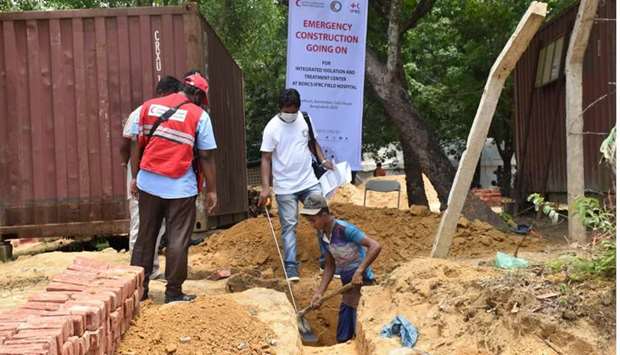The representation mission of Qatar Red Crescent Society (QRCS) in Bangladesh has initiated an emergency intervention to deal with the risks of the novel coronavirus (Covid-19) at the Myanmar refugee camps with an initial budget of $65,000.
The new scheme is addressed to 106 workers at health facilities run by QRCS at the refugee camps of Cox’s Bazar, 1,800 refugee families (11,000 persons), and confirmed and suspicious cases of infection. These figures are likely to increase as activities are expanded with updated action plans.
Implemented in co-operation with Bangladesh Red Crescent Society (BDRCS) and the International Federation of the Red Cross and Red Crescent Societies (IFRC), the intervention is aimed at raising health awareness of Covid-19 risks and prevention to reduce its spread among the refugees and QRCS health professionals.
Another aim is to promote proper hygiene and precautions against any potential outbreak in line with the guidelines of the World Health Organisation (WHO) and health authorities of Bangladesh, which include hand washing, avoid face touching, social distancing, and staying at home.
To secure the necessary health care services, QRCS is establishing a 50-bed quarantine unit to isolate and treat mild and moderate Covid-19 cases. It is located at the QRCS-managed field hospital in refugee camps, which host around 1 million refugees from Myanmar and serves the region’s 400,000 population.
The mission continues to attend the co-ordination meetings with all active players in the Coronavirus pandemic response. Personal protection equipment (PPE) are distributed to QRCS’s medical professionals and community-based health workers, including masks, gloves, sanitisers, soap, and other safety supplies.
Health service providers are educated about preventive measures, how to deal with patients and control infection, and early warning and response in emergencies.
Also, 245 health education sessions were held for refugee families, and visits were made for 1,515 families. There are plans to distribute food baskets to thousands of local families negatively affected by the lockdown.
At the QRCS-operated health centres in Camps 19 and E8, the staff was divided into two shifts, to reduce the workforce on duty as per the instructions of the competent authorities.
Implemented in co-operation with Bangladesh Red Crescent Society (BDRCS) and the International Federation of the Red Cross and Red Crescent Societies (IFRC), the intervention is aimed at raising health awareness of Covid-19 risks and prevention to reduce its spread among the refugees and QRCS health professionals.
Another aim is to promote proper hygiene and precautions against any potential outbreak in line with the guidelines of the World Health Organisation (WHO) and health authorities of Bangladesh, which include hand washing, avoid face touching, social distancing, and staying at home.
To secure the necessary health care services, QRCS is establishing a 50-bed quarantine unit to isolate and treat mild and moderate Covid-19 cases. It is located at the QRCS-managed field hospital in refugee camps, which host around 1 million refugees from Myanmar and serves the region’s 400,000 population.
The mission continues to attend the co-ordination meetings with all active players in the Coronavirus pandemic response. Personal protection equipment (PPE) are distributed to QRCS’s medical professionals and community-based health workers, including masks, gloves, sanitisers, soap, and other safety supplies.
Health service providers are educated about preventive measures, how to deal with patients and control infection, and early warning and response in emergencies.
Also, 245 health education sessions were held for refugee families, and visits were made for 1,515 families. There are plans to distribute food baskets to thousands of local families negatively affected by the lockdown.
At the QRCS-operated health centres in Camps 19 and E8, the staff was divided into two shifts, to reduce the workforce on duty as per the instructions of the competent authorities.

